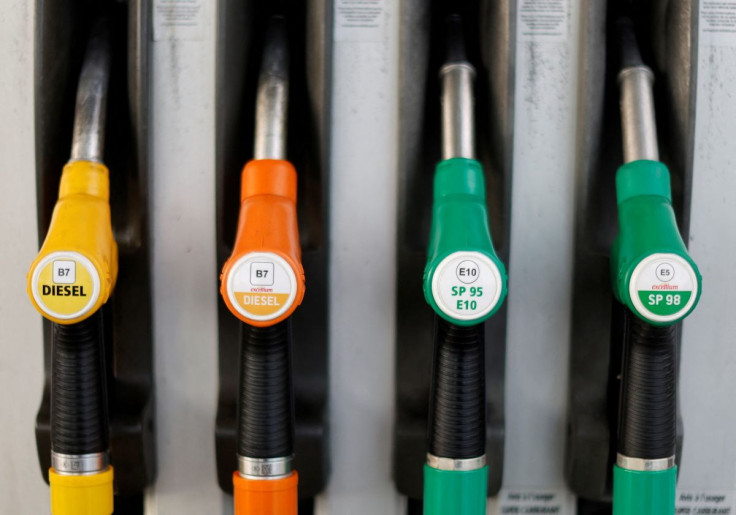In France, Voters' Perception Of Purchasing Power Could Hurt Macron In The Ballot

Self-employed electrician Loic Luboue Le Quere lives in a rural village 80 km (50 miles) south of Paris and relies on his van for work. In recent months, his diesel bill has jumped, squeezing his finances.
Luboue Le Quere said it now cost him 90 euros to fill the tank and that he was shelling out more than 500 euros a month on diesel, a third more than just six months ago, as French gasoline prices hit record levels.
A month out from a presidential election, the frustrations of people like Louboue Le Quere over living costs is a concern for President Emmanuel Macron, who has warned that the fallout from the Ukraine war would drive inflationary pressures higher.
"It's my working tool, I don't have a choice but to use it," Luboue Le Quere said at his home in Laval-En-Brie, a village with just a few houses. "Living in the countryside, we need our car to go grocery shopping and to take the kid to school."
And it is not just fuel. Luboue Le Quere's work materials, electricity and convenience goods are all becoming more expensive.
Inflation is becoming so taxing on the family's budget, he said, that they now deprive themselves of evenings out and zero in on special deals when buying much of their fruit and meat.
"At this point, we're surviving," he said. "It feels like we're working just to pay the bills."
BITE OF INFLATION
Voters have for months cited the cost of living and purchasing power as their number one concern ahead of April's election, as inflation surges globally on the back of rising commodity prices and tight supply chains.
Reuters spoke to more than 20 residents of rural and semi-urban areas who all complained of rising food, fuel and energy prices and the pressure these were putting on their budgets.
Inflation has, though, been lower in France in recent months than elsewhere in the European Union, largely due to the government capping power and gas prices ahead of the vote.
Even so, inflation hit 3.6% in February, the highest since 2008. Households are feeling the pinch; an IFOP poll in February showed three-quarters of those surveyed felt their purchasing power had deteriorated over Macron's term.
Such polls have left officials at the presidency and finance ministry perplexed. The Treasury estimates gross disposable income, which economists use as a gauge of purchasing power, grew twice as fast under Macron as under his two predecessors, Socialist Francois Hollande and conservative Nicolas Sarkozy.
Mathieu Plane, an economist at the OFCE think-tank said purchasing power had largely stagnated for a decade under their presidencies, leaving an entrenched feeling that people just cannot get ahead.
"People's perception of purchasing power is rarely very positive, even during the best of times," Plane said. "Macroeconomics ... doesn't explain individual situations."
PURCHASING POWER PINCH
The perception gap presents a risk for Macron, even as polling points to him to beating Marine Le Pen, of the far-right Rassemblement National party, in a run-off.
The anti-government "Yellow Vest" protests which erupted in 2018 over diesel taxes and living costs and morphed into a revolt against the president himself, who has been vulnerable throughout his mandate to accusations from critics of being disconnected from the hardships faced by regular households.
Even if data shows that all but the poorest 5% of households are better off than five years ago, according to the Institute for Public Policies, it is not felt in the back pocket.
Adama Jatta, 54, who lives near Evreux, west of Paris, said: "Everything is higher, it's too much. At the end of the month I have nothing left."
The Treasury expects people's disposable incomes to be up 4%-6% by the end of Macron's term from the start in 2017, after taking inflation and population growth into account and despite France's worst post-war recession at the start of the pandemic.
On the lower end of the income scale, government incentive payments to encourage people to look for work have offered a boost as have increases in some welfare handouts.
Various tax cuts have helped out the middle and upper classes, while a stronger labour market has boosted everyone across the income spectrum, data shows.
Nonetheless, the gains made over the last five years risk being offset by surging inflation, driven by high energy prices that look set to be pressured further by the crisis in Ukraine.
"The increase in the price of oil, gas and raw materials has and will have consequences on our purchasing power," Macron said on Wednesday, a day before launching his re-election bid. "I have and will have only one compass point: to protect you."
Luboue Le Quere said he received a 100 euros cheque from the government in December to help cushion rising fuel costs, but that it made little dent in his bills.
He said it was the same with a council tax cut he received last year that was eroded by a doubling of another property tax.
Luboue Le Quere said he does not know yet who he will vote for on April 10, but that one thing is certain. "I won't vote for Emmanuel Macron. I feel like things have gone worse since he's here."
© Copyright Thomson Reuters {{Year}}. All rights reserved.





















